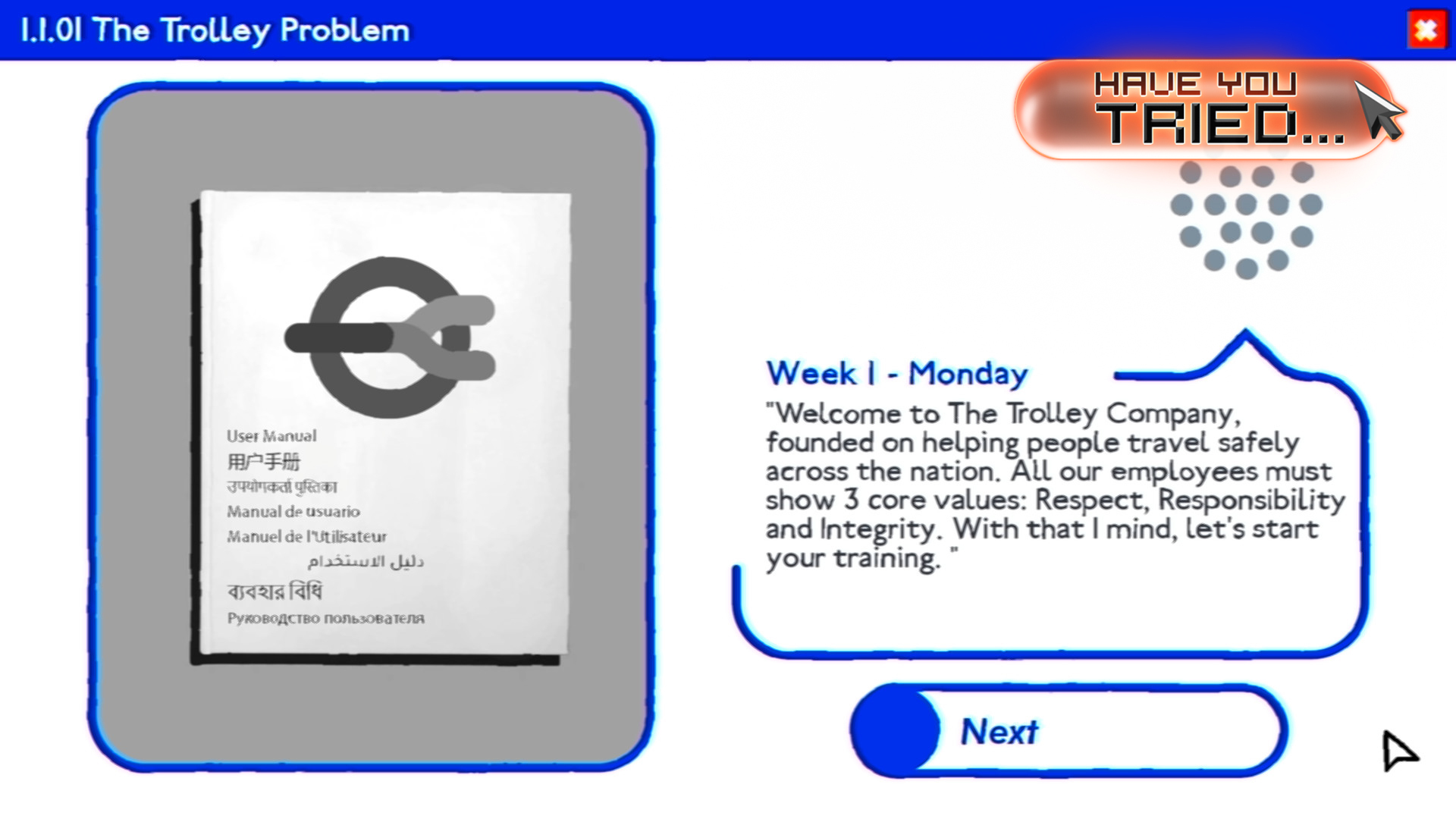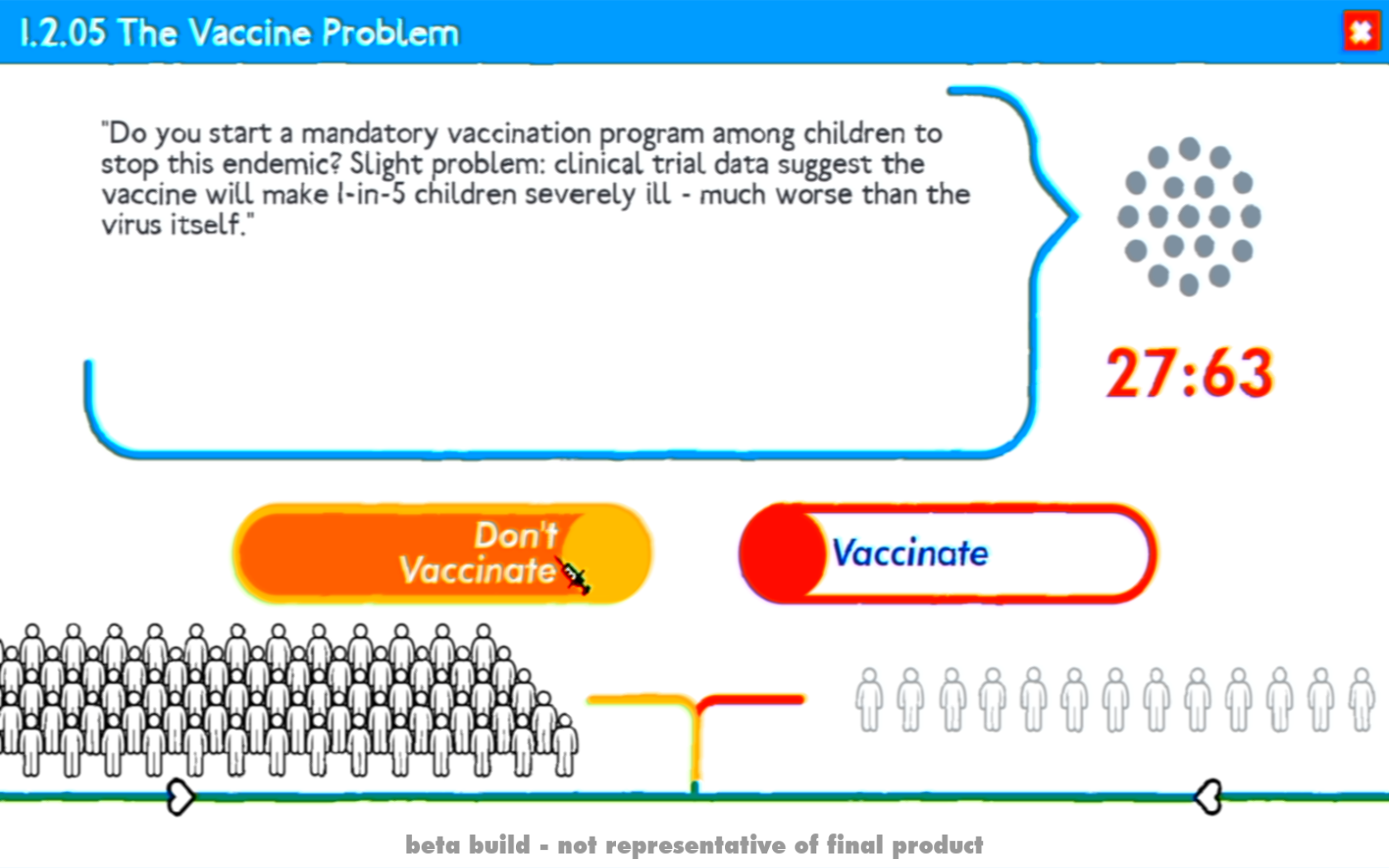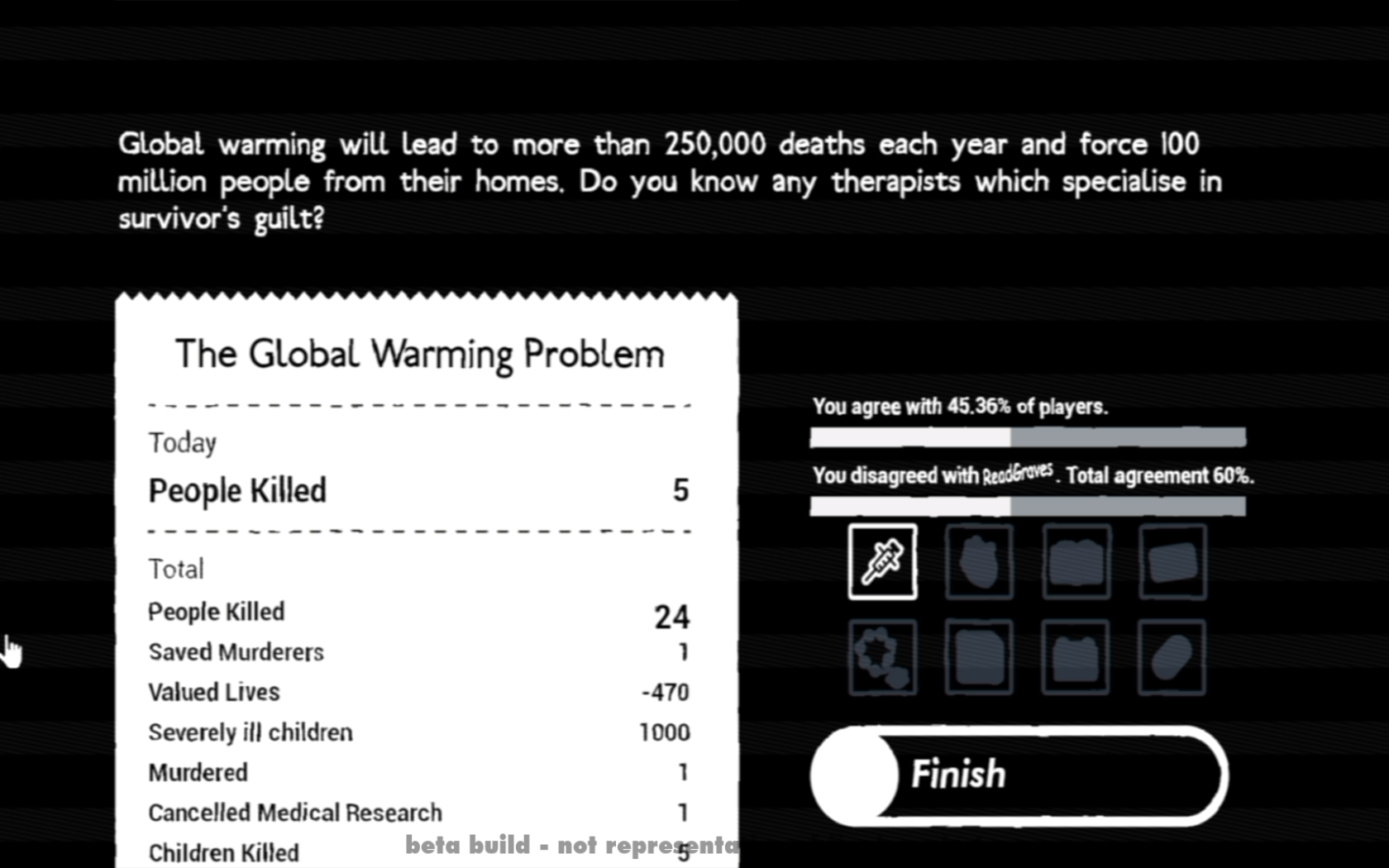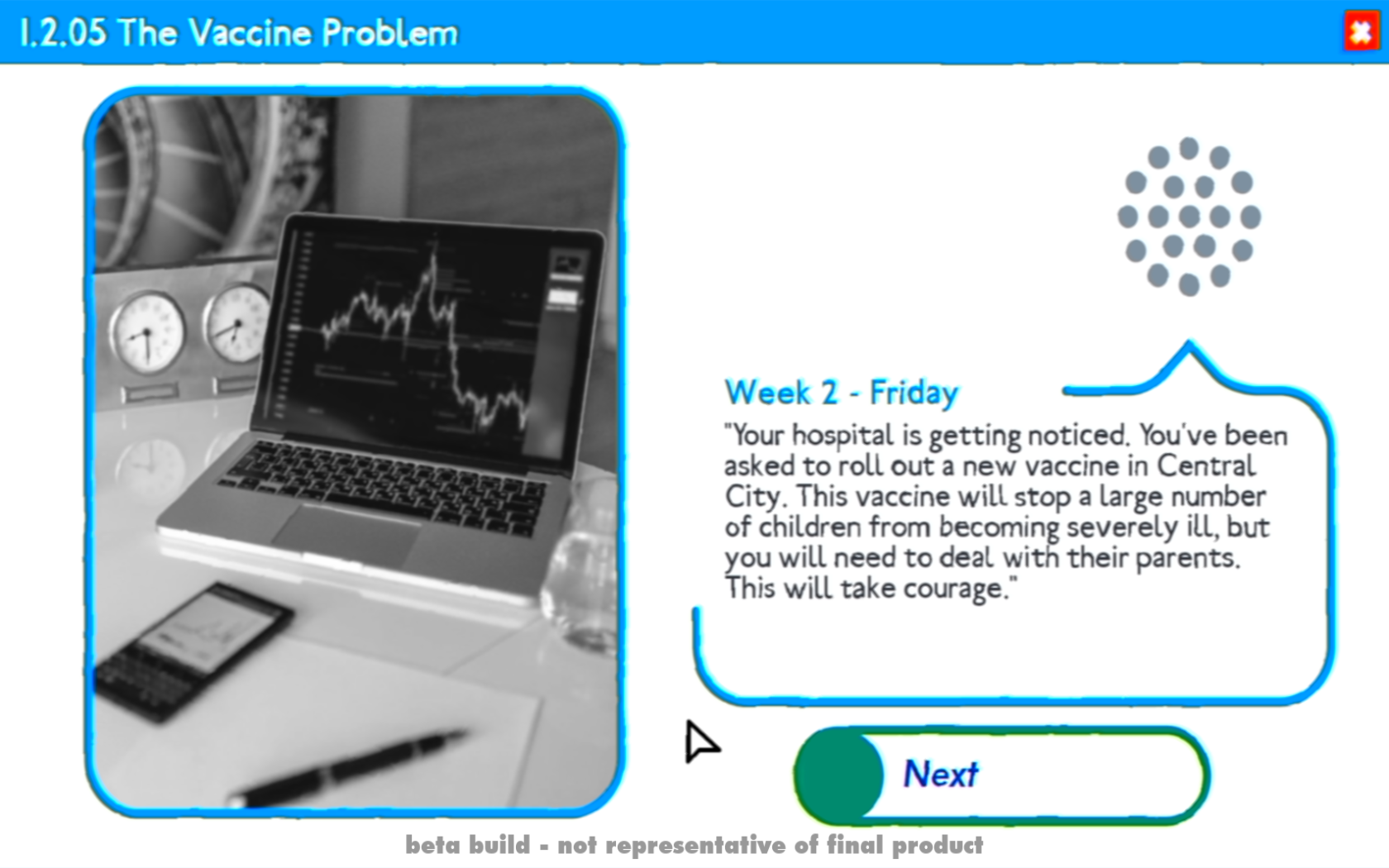Have you tried… making decisions that question your moral fiber in Trolley Problem, Inc?
Think you're a good person? Trolley Problem, Inc might beg to differ

I've just made 1,000 children severely ill. Less than five minutes into Trolley Problem, Inc and I feel like a total scumbag. In my defence, an endemic among kids threatened the masses, and, when asked to choose between rolling out a vaccination programme or to decline one, the decision felt like a no-brainer. Before green-lighting the initiative, granted, I was told that clinical trial data suggested one in five children would become "severely ill" after the jab, amounting to 1,000 sick kids every week – a sickness described as "much worse than the virus itself."
As a parent of two, and the partner of a social worker, I find myself more protective of children than ever. And yet the Trolley Problem, Inc has me questioning my morals like never before. Earlier, as a runaway train was gunning towards Polly, a young child playing nurses in a sandpit, I opted to reroute the carriage towards five other people. When we'd whizzed way past the point of no return, the game asked coyly: "I wonder if any of the five are children? Maybe all of them?" Suddenly, making children sick, and not, you know, dead felt like the lesser of two evils.
Doctor death

"I've sacked five people, I've been responsible for the deaths of 29, I've enabled a murderer to kill again, I've committed murder myself, I've cancelled groundbreaking medical research, and I've executed a missing, albeit dying, dog."
And it gets worse. I've just made five graduates redundant from a tech company in order to save a time-served employee, a decision based on the assumption younger talent is better equipped to bounce back. "I wouldn't look at the obituaries today," the game informs immediately thereafter. "Turns out one of those graduates worked really hard to get their job here." I'm now barely a few weeks into Trolley Problem Inc's imaginary timeline and I've sacked five people, I've been responsible for the deaths of 29, I've enabled a murderer to kill again, I've committed murder myself, I've cancelled groundbreaking medical research, and I've executed a missing, albeit dying, dog. Jesus Christ, who am I?
As a gamified version of the titular thought experiments that were popularised in the 20th century in the fields of psychology and philosophy, there are no right or wrong answers in the Trolley Problem, Inc. Instead, it's a game built around thought-provoking choices that underline the fragility of moral-based decision-making. We are, as you'll quickly discover yourself, pretty fallible as human beings on that front. Okay, so you're going to kill that dying dog in order to put it out of its misery – but who are you to make that decision? Shouldn't you report the dog missing and allow its owner to make that call? Or maybe you should get help, surely you could ring up a nearby veterinarian? Oh, the dog died while you were trying to find its owner? You should have put it out of its misery in the first place. Get your guard up, because Trolley Problem, Inc delivers a blow to the gut at every turn.

"I was giving the answers that I thought were the right ones; the ones I reckoned the AI wanted to hear, lest it cast judgement on me, a seemingly less likable person with every click."
In a world now two years deep into a global pandemic, Trolley Problem, Inc is an uncomfortable, wonderful, painful, and brilliantly thoughtful experience all at once, one that continually stops you in your tracks the deeper you go. Sometimes I was answering for myself. Other times I was pushing the boundaries of the game. And other times again, I was giving the answers that I thought were the right ones; the ones I reckoned the AI wanted to hear, lest it cast judgement on me, a seemingly less likable person with every click.
One standout feature tied to all of this comes at the end of every decision made, where you're shown a percentage of how other players voted – similar to how Telltale's The Walking Dead handles decision making, and how players are perceived by others. With repercussions and throwbacks to past questions laced through its narrative, there are similarities to Lucas Pope's 2013 indie gem Papers, Please in there too, while creator Samuel Read-Graves says if Trolley Problem, Inc can help educate players through gameplay and discussion, similar to the likes of Hellblade: Senua's Sacrifice, then he'll be over the moon. There's even academic sources tied to each quandary, should you fancy some extra-curricular reading.
Read-Graves tells me he began working on Trolley Problem, Inc in December 2020, and while he doesn't have a background in philosophy, he did find himself asking deeper questions about life and existence after his father had a major, but non-fatal, heart attack in 2018. Naturally, Read-Graves expected the inclusion of vaccines to be a reality-reflecting talking point about Trolley Problem, Inc in 2022, and while this is still the case, the Russian invasion of Ukraine has since gripped the world and its news cycle. Ethics and the value of life strike at the very heart of Trolley Problem, Inc's message, which makes its full release next month, April 2022, feel almost serendipitous.
Sign up to the GamesRadar+ Newsletter
Weekly digests, tales from the communities you love, and more
Platitudes and Plato

Ultimately, Trolley Problem, Inc asks difficult questions (55 in total) of its players, but it does so in order to start conversations. Read-Graves says he hopes its themes of fact-checking, of citing sources and exploring information can help combat fake news, and that in doing so, players can see the results of their actions – and others – unfold in real-time. Read-Graves says that while video games are unique in how they relay information, by way of interactivity, the 'good versus evil' dichotomy in so many games is handled by game characters and not directly by the player.
"The persuasive nature of Trolley Problem, Inc comes from the comedy, making tension for the player while they try to wriggle out of whatever problem is put before them by the narrator," Read-Graves adds. "Much like sucking up to a parent after getting Warhammer paint off the new carpet or trying to dodge detention because you inadvertently ate your own homework." Read-Graves then cites a Plato quote that's stuck with him over the last few years and has helped inspire the game itself: “Those who practice philosophy in the right way are in training for dying and they fear death least of all men."
Which feels like sage advice. Personally, though, I'd rather just make it through another day without harming any more animals or poisoning any more children. Is that really too much to ask? Ask and answer that question yourself when Trolley Problem, Inc launches on PC via Steam next month.
Preserving life isn't easy in Trolley Problem, Inc. It might be time to check out the best survival games fighting for their lives.

Joe Donnelly is a sports editor from Glasgow and former features editor at GamesRadar+. A mental health advocate, Joe has written about video games and mental health for The Guardian, New Statesman, VICE, PC Gamer and many more, and believes the interactive nature of video games makes them uniquely placed to educate and inform. His book Checkpoint considers the complex intersections of video games and mental health, and was shortlisted for Scotland's National Book of the Year for non-fiction in 2021. As familiar with the streets of Los Santos as he is the west of Scotland, Joe can often be found living his best and worst lives in GTA Online and its PC role-playing scene.


